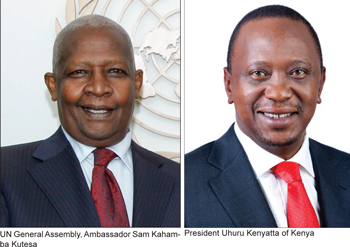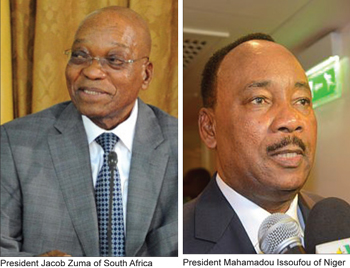By Saeed Shabazz-Staff Writer-

UNITED NATIONS – The president of the 69th session of the UN General Assembly, Ambassador Sam Kahamba Kutesa from Uganda, spoke before the first African leader took the podium.
He said the leaders would present positive visions for the next 50 years for a continent that has great problems and great potential.
Africa is “emerging from the long night of decline” and its nations are becoming “more credible partners with many serious actors beyond our shores,” said Uganda’s President Yoweri Musevini.
The African leader noted that Africa is emerging from centuries of colonialism with trillions of dollars in purchasing power growing at an annual rate of 3.2 percent.
During his address, Mauritania’s President Mohamed Ould Abdel Aziz said the international community “is invited to join Africans in their hopes and legitimate aspirations for peace, security and sustainable development.”

Speakers from all nations acknowledged the General Assembly theme for 2014 “Delivering On and Implementing a Transformative Post-2015 Development Agenda.”
President Aziz noted that unlike in 2000, when the Millennium Development Goals were adopted, Africa now “speaks with one voice, seeks to create development to become a healthy area free of scourges, wars and conflicts, and where justice, good governance and respect for human rights prevail.”
Eight of the UN goals were adopted by the General Assembly in 2000, setting clear targets for improving conditions in a wide range of areas, including halving extreme poverty rates, halting the spread of HIV/AIDS and more contributions from developed nations for increased development assistance.
President Uhuru Kenyatta of Kenya stressed the importance of this year’s session as it dealt with development and adoption of the Post-2015 Development Agenda, which will layout future global development goals. “The new world development agenda must address itself to the entire cross-section of social, economic and environmental challenges that face the world in the 21st century,” he said.
Turning to Kenya’s own development, he cited “foundational changes” over the past four years including universal immunization, promotion of breastfeeding for the first six months of a child’s life, provision of fortified foods and insecticide-treated mosquito nets, and free maternal and childcare in hospitals.
President Jacob Zuma of South Africa said Africa would not continue to see the United Nations as an honest partner for development unless the world body reformed the 15-member UN Security Council.
President Mahamadou Issoufou of Niger warned against attempts to “balkanize” Africa. “The Pandora’s box of balkanization that is open in Africa needs to be closed again if one does not want the whole continent to go up in flames,” President Issoufou said. “The future of Africa is in its unity. The move beyond the borders inherited from colonization is not to create new borders along ethnic or religious bases but to go beyond the current boundaries via integration.”
Africa will be the continent of the 21st century with a strong middle class born out of good policy and economic governance that eases poverty through income distribution, the president of Niger predicted.
Social justice, political stability and sustainable development in African countries can best be achieved through genuine and committed support for the ownership of means of production that favor the poor, said President Robert Mugabe of the Republic of Zimbabwe.
“My government has gone a long way in laying the foundation for sustained food production through our Land Reform Program. That households have also become the masters of their own destiny through increased land possession,” he said.
“It is very easy to say powerful things at the UN General Assembly, but more difficult to actually do them,” Melvin P. Foote, CEO of the Washington-based organization Constituency for Africa told The Final Call. “There is a lot of work ahead if Africa is to truly rise and take her rightful place in the world.”
Mr. Foote agreed with leaders who stressed “realizing African unity” has got to top of the list of things to do.
Professor Molefi Kete Asante, who teaches African American Studies at Temple University, said, “African people should be able to accomplish what they want without begging White people.”
Prof. Asante, who recently published “As I Run Toward Africa,” argued African leaders must create an independent political component not tied to their past colonial masters.
“And if they cannot establish political independence it will set Africa up for further problems,” he said.
Dr. Leonard Jeffries Jr., scholar and president of the World Diaspora Union, is “optimistic” despite the many obstacles in the path to a United Africa. “However, African leaders are trapped into believing that the European systems are going to work going forward,” Dr. Jeffries told The Final Call. “They are asking for a little money from Europe and all Europe wants in return is to continue to exploit African mineral resources,” he said.
We cannot accept this colonial compact that only enriches the West, the Chinese and India, Dr. Jeffries continued. “There is a revolution taking place that is transforming Africa,” he said. It is coming from youth, not from those who spoke at the United Nations, he added.












